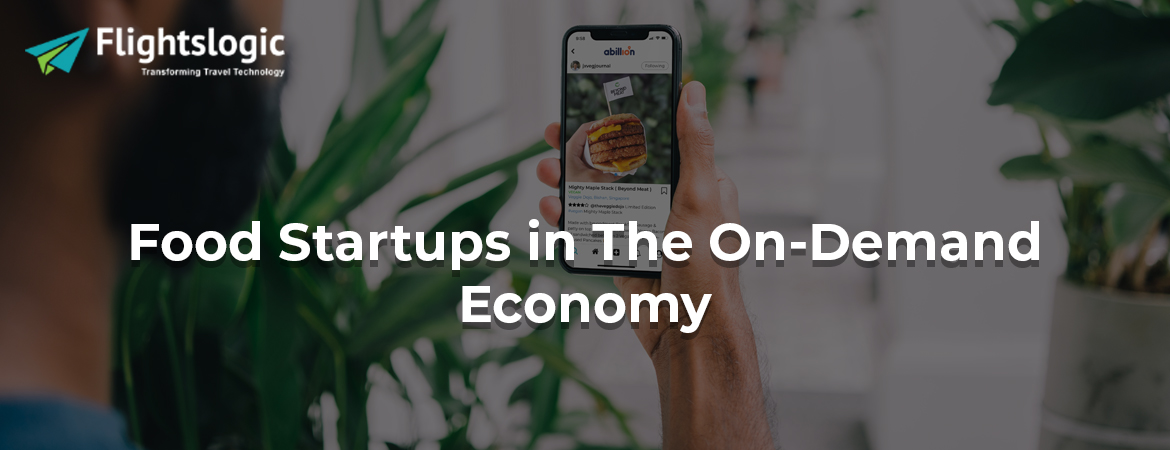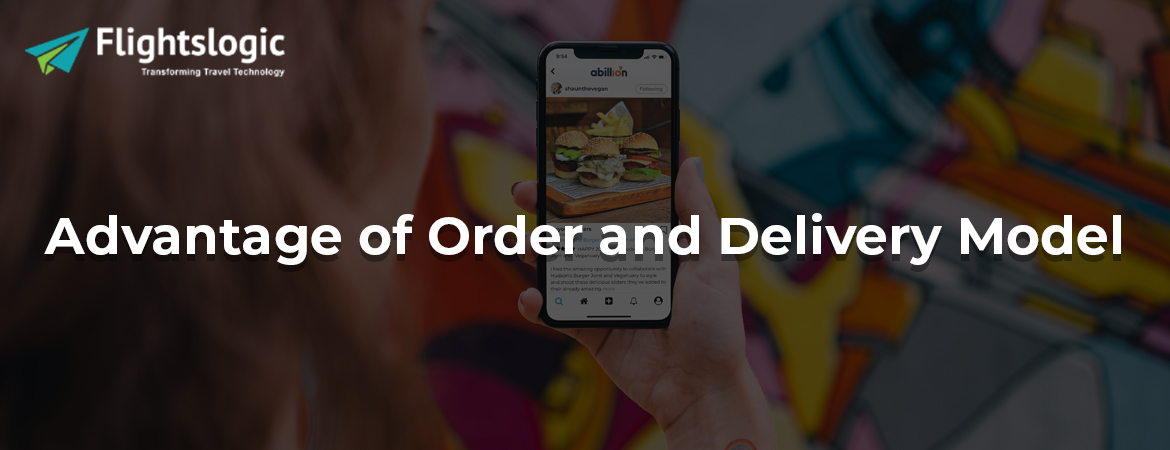On-Demand Food Delivery Business - Take Your Business To New Heights And Success
Online food delivery apps have emerged as the movers & shakers of the food industry with limitless possibilities & will continue to prosper.

Currently, Food delivery has become a one-of-a-kind and succulent bit for many entrepreneurs out there. Thousands of business-minded people are pursuing meal delivery as one of the best and most rewarding startups today.
A food delivery business is a start-up whereby one utilizes a courier service to deliver meals to consumers on demand. This is a business platform growing thanks to the ease of executing requests and deliveries via mobile apps, mobile phone calls, or a genuine website.
Online food delivery is projected to be a large part of the global revenue, and annual growth revenue of 7.5% will result from the market. Many food delivery startups benefit from these platforms, as most of their clients frequently order their meals online.
Major deliveries on demand include cooked dishes, groceries, as well as catering and wholesale services. Many entrepreneurs are taking marketing leadership and utilizing this opportunity to deliver quality services to their clients and make money.
The demand for home food delivery has surged significantly with many food business owners opting to run their startups online. Substantially, the number of people using smartphones and the internet has surged tremendously.
In essence, the overall demand for meal delivery is increasing on a daily basis, and there is a lot for businesses to utilize with the right business models.
Food Startups In The On-Demand Economy
More than delivery convenience, they also save us our time and effort.
Five specific opportunities for people by saving time:
Post-Benefit Convenience – Making it fast and easy to re-purchase. For example, You can save your address and payment details, bookmark your favorites restaurants to re-order in seconds.
Decision Convenience – Making it fast and easy to choose. For example, in Zomato you can view ratings and reviews of restaurants, and decide to order.
Access Convenience – Making it fast and easy to get. For example, Hot Meals get delivered to your location within 30 minutes of your order.
Benefit Convenience – Making it fast and easy to enjoy. For example, you can order from more than one restaurant, and get it straight to your home.
Transaction Convenience – Making it fast and easy to pay. For example, All apps let you pay with cards, bank accounts, or wallets like Google Pay.
The on-demand food industry has disrupted traditional markets by adopting a full-cycle approach to the three basic components of a meal experience at a restaurant: Ordering, Cooking, and Delivering.
Ordering – Orders are customer requests to prepare and deliver food. All food on-demand businesses receive orders via an app, a website, or phone. The orders could be for their own kitchen or another meal provider they have partnered with.
Cooking – Cooking is the process of preparing meals for customers. Meals could be pre-cooked or cooked after an order is received.
Delivering – Delivery i.e the transportation of goods is the backbone of any on-demand business. Businesses can have different delivery models depending on various factors.
Types of Food Delivery Business Model

Basically, there are three types of food delivery models present in the market. Let us go through all of them one by one. But remember most online food delivery businesses follow the marketplace business model.
1. The Order Only Model
In this type of food delivery business idea, you will act as a bridge between the users and the local restaurants through your online platform.
You will facilitate the users and restaurants to connect with each other to place and deliver orders. The main aim of such a food delivery business model is to let the restaurants reach out to the larger audience base. On the other hand, let customers easily order food from their favorite restaurant.
The two-phase of this food app business model works like,
For Order Allocations:
-
Customers can place the order from the website or applications.
-
Restaurants will receive the order through fax, mail, or mobile notification.
-
They will confirm the order and send a message to the customers.
-
In some cases, the orders are directly printed into the kitchen with the help of the POS system.
For Delivery:
-
A restaurant delivery boy delivers the order to the customer’s doorstep.
-
In case of any issues, a customer's mobile number is made available to the delivery boy.
Advantage of Order Only Food Delivery Model
In such a type of business model, you being the owner, do not have to face any issues regarding anything related to the food delivery. You can charge flat commission fees from the restaurants on every order placed.
Challenges of Order Only Model
-
In the beginning, attracting eateries to your platform might be a challenging thing with this delivery business opportunity. Therefore, you need to research what exactly you need to offer to eateries.
-
You need to work more on the marketing of your online platform in order to make your business successful. And the fact is for this food delivery model; your success highly depends on the services that restaurants are giving to their customers.
2. The Order & Delivery Model
This food delivery business model handles restaurants, customers, and delivery. It is one of the most common marketplace solutions used by businesses. Most of the eateries would register themselves with this type of food delivery platform as they don’t need to deal with the delivery thing.
Some of the most popular food delivery apps for this model are UberEats, DoorDash, Zomato, etc. To operate this type of food delivery business, you need more resources than the first one. The working of order and delivery business model goes like this,
For Order Allocations:
-
Restaurants can register on your online platform.
-
Customers can place an order from the restaurant through your platform.
-
The orders are received by the restaurant through website or app notifications.
-
The customers can either pay online or cash on delivery as per their choice.
For Delivery:
-
The delivery boy nearest to the restaurant will get the notification to receive the order and deliver it to the customer’s place.
-
A delivery fee will be applicable to the customers based on the distance.
-
Customers can even add instructions for the delivery like don’t ring the doorbell, place an order outside, and more.
Advantage of Order and Delivery Model

-
For this food delivery business model, your success will rely upon the user experience that they get from the restaurants and delivery boys. You can charge a flat commission to the restaurants on every order and even charge a delivery fee to the customers if the order is below a certain amount or far from the customer’s delivery location.
-
You can provide a flexible and instant delivery to the customers’ by training delivery boys. This will help you to get higher ratings for your food delivery business. All you need to do here is keep an eye on activities going around your business and work on any issues if found.
Challenges of Order & Delivery Model
-
The biggest challenge of this food delivery logistics is to deliver the order on time. The delivery time matters for most customers; therefore, you must look into the ways to deliver food on time.
-
And the order delivery time is crucial, especially for the lunch order due to the working time. Another challenge here is to manage all the resources of your business.
3. The Fully Integrated Model
The third food delivery model revolves around meal delivery startups, which is quite different from the above two. This model is a complete meal delivery business plan to start your own venture.
A few examples of such types of meal delivery startup are Rocket Food, Extra Plate, Eat Purely, and more. Here everything starting from cooking to delivery should be taken care of by you being the owner.
Either you can cook the meal at your place or can hire a chef for the same. This type of prepared meal service usually partners with the chefs. The working of a fully integrated model goes like this,
For Order Allocations:
The order allocation is this type of meal delivery business plan that usually occurs in two ways mentioned below.
-
The first one has zero involvement of the admin i.e.; the order will be directly notified to the nearest driver.
-
For the second one, there is some involvement of the admin for the order allocation. When a customer places the order, it will first go to the admin panel, and then the admin will allocate it to the nearest driver.
For Delivery:
-
Food delivery here is done by drivers that a company hires.
-
There can be either a scheduled delivery or an instant delivery as per the customers’ requirements.
-
Every driver is given a set of meals to deliver at the customer’s doorsteps.
Advantage of Fully Integrated Model
The main advantage here is you don’t need to rely on a third party for user experience. As in this type of meal delivery startup, everything is operated by your company. If everything goes right with your meal delivery business plan then you can earn huge and enhance your business.
Challenges of Fully Integrated Model
The biggest challenge faced by this food delivery business model is the operational cost. Many meal delivery startups need to shut their doors because of the operational costs. This happened especially with those who tried to cook their own food. One way to save the business from such failure is to try for multiple deliveries at a time and enhance the user experience.
Embrace the Right Meal Delivery Solutions
With the many benefits of meal delivery apps, don’t have any reservations about investing in such a business start-up.
You will get an opportunity to stay head and shoulders above competitors and also competently deal with a large clientele base that will translate to good returns and reputation. If you don’t know how to embrace such advanced technologies in the business world, don’t fret.
Feel free to let a reputed on-demand meal delivery app development company help. The experts you will come across will aid you to choose the best business model and help you implement it into your start-up.


